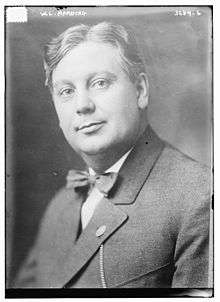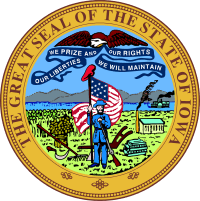William L. Harding

- This article refers to the former Iowa Governor. Please see William Harding (disambiguation) for other men with the same name.
William Lloyd Harding (October 3, 1877 – December 17, 1934) was an American politician. He was the 22nd Governor of Iowa, from 1917 to 1921.
Early life
William Lloyd Harding, was born in Sibley, Iowa, on October 3, 1877. He later lived in Sioux City.[1] From 1897 to 1901, he attended Morningside College, and then went on to earn his law degree from the University of South Dakota.[2]
Political career
Harding entered politics in 1906, serving as a Republican member of the Iowa House of Representatives, a position he held for six years.[2] He also served as Iowa's lieutenant governor from 1913 to 1917 during the terms of Republican governor George W. Clarke. Harding won the 1916 Republican gubernatorial nomination, won the election in a landslide (winning 98 of 99 counties[3]) and was sworn into the governor's office on January 11, 1917. He was reelected to a second term in 1918, and thus was governor during four years which roughly coincided with World War I and especially the United States' involvement in it.[4] During that time, there were "defense councils" in every state,[5] and the entry of the United States into the war followed President Wilson's famous statement "the world must be made safe for democracy",[6] and its companion statement, "millions of men and women of German birth and native sympathy live amongst us....Should there be any disloyalty it will be dealt with a firm hand of repression.”[6]
Harding was convinced that destroying the vital bond of language within ethnic communities would force assimilation of minorities into the dominant culture and heighten a sense of patriotism in a time of war. He understood the connection between communication and assimilation. Harding became the only governor in the United States to outlaw the public use of all foreign languages. Governor Harding thought the loss of one’s native language was a small sacrifice compared to the good it could do saving the lives of American boys overseas by curbing sedition at home. He also claimed that all foreign languages provided an opportunity for the enemy to scatter propaganda.[7] He addressed those issues in an edict whose title was the Babel Proclamation, which prohibited all public communication in any language other than English.[8]
The Babel Proclamation, which forbade the use of foreign languages in public, over the telephone, in school, and in religious services, was controversial, and possibly unconstitutional. It came about due to the large anti-German sentiment during the First World War. Harding's time in office was marred by scandal and other controversy. His hostility towards immigrants and foreign ethnic groups extended beyond Germans and, for example, included Iowans of Norwegian descent.[9]
Post-Governor life
Harding was known for his oratory abilities and he continued to be a favorite speaker for Republican party events long after his term as Iowa’s governor had ended.[10]
He is buried in a mausoleum at the Graceland Park Cemetery in Sioux City, Iowa.[1]
References
- 1 2 William L. Harding at Find a Grave
- 1 2 "The Iowa Legislature: Historical Information". Archived from the original on March 4, 2016. Retrieved November 4, 2016.
- ↑ Derr, Nancy. "Harding, William Lloyd" The Biographical Dictionary of Iowa. University of Iowa Press, 2009. 4 November 2016.
- ↑ William, Lloyd Harding. From Iowa, Its History & Its Citizens, Volume 2, 1918.
- ↑ http://people.cas.sc.edu/dubinsk/LING240/readings/Frese.2005.Babel.Proclamation.pdf,footnote17[]
- 1 2 Woodrow Wilson, War Declaration to Congress, 2 April 1917
- ↑ http://people.cas.sc.edu/dubinsk/LING240/readingsFrese.2005.Babel.Proclamation.pdf
- ↑ "Orders German Language Out of All Schools in Iowa." Des Moines Register, 26 May 1918: 10A
- ↑ William L. Harding, Iowa General Assembly
- ↑ Sioux City Public Museum Pearl Street Research Center, SC-12, Folder #2
| Political offices | ||
|---|---|---|
| Preceded by George W. Clarke |
Lieutenant Governor of Iowa 1913–1917 |
Succeeded by Ernest Robert Moore |
| Preceded by George W. Clarke |
Governor of Iowa January 11, 1917 – January 13, 1921 |
Succeeded by Nathan E. Kendall |
